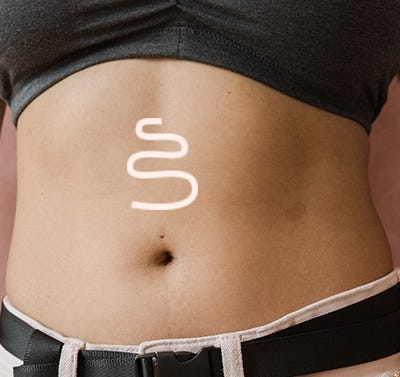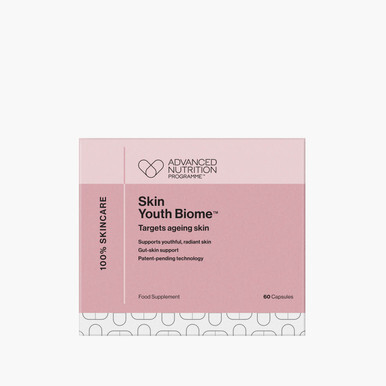How our gut health is linked to our skin

This may come as a surprise but how your skin looks has a lot to do with your gut health and the balance of your microbiomes. Having an unhealthy gut is when there is an imbalance of good and bad bacteria. This is called dysbiosis. Some of the symptoms of this are poor digestion, poor skin quality, lethargy, and poor concentration. Before we dive into the details on the gut-skin connection and what causes an unhappy gut, let’s start with the basics. What is the microbiome? Why is it important to have a balanced microbiome? Our skin researchers reveal all.
What is the microbiome?
So, what is the microbiome? You may ask. It’s a community of bacteria, viruses and fungi that live in and on our body.
While some of the bacteria is not good for us and associated with diseases, others are extremely beneficial for our immune system, weight, heart and are needed to keep us healthy ¹.
Why the gut bacteria are so important
The good bacteria in our gut is very underrated and here’s why. They play essential roles in our overall health as well as our skin. Helping us digest food, produce B vitamins for energy, vitamin K for wound healing, and support our immune system to fight off infections. They also create beneficial molecules that let us know when we’re full, helping with weight management² ³. Research also suggests that having a diverse microbiome (a large variety of balance of good and bad bacteria) can have a positive impact on our skin ³.
The gut-skin connection
Now let’s break down the gut-skin connection. There is increasing evidence that shows overall gut health is very closely linked to skin health. This is known as the ‘gut-skin axis’ which refers to the connections between our gut and our skin. The gut and skin both interact with our internal and external environments. This communication is done through our body’s microbiomes. When the gut microbiome is imbalanced (too much bad bacteria) this causes a lack of regulation in our skin microbiome, which can result in the skin overproducing oil, triggering breakouts, and leading to poor skin health.
Poor diet and lifestyle choices can contribute to dysbiosis and result in inflammation in the gut. This inflammation can lead to inflammation into the body and can irritate your skin and cause dryness, flakiness, and redness to appear ⁴.
What makes an unhappy gut?
So now we know how the gut and skin communicate to each other. Let’s look at what makes a gut imbalanced ⁵. At Advanced Nutrition Programme™, we call this a S-A-D gut due to the words all beginning with each letter of the word ‘S-A-D’. Below are some of the factors that can contribute to this.
- Stress
- Smoking
- Sleep problems
- Alcohol
- Ageing
- Antibiotics
- Diet (High sugar, low fibre, food intolerances)
If some of the above is relevant to you, you may have experienced symptoms of dysbiosis mentioned previously, including digestive issues, poor skin quality, lethargy, and poor concentration. Now let’s see what changes you can make for a happier, healthier gut.
Recommendations for a happy gut
Our skin researchers recommend incorporating some of the below choices for a healthier, balanced microbiome ⁵.
- Avoid high sugary foods and drinks
- Consume a diet rich in fibre
- Avoid drinking too much alcohol
- Get the recommended 7-9 hours’ sleep a night
- Lower your stress levels (yoga, meditation, exercise)
- Take a microbiome supplement (skin-friendly bacteria)
Combining some of the healthier choices and lifestyle changes above may help rebalance your microbiome and lead to glowing, hydrated skin. Here are some delicious foods and herbs that can be easily added into your weekly diet.
High fibre foods
- Legumes
- Beans
- Peas
- Asparagus
- Berries
Fermented foods
- Kimchi
- Sauerkraut
- Yoghurt
- Tempeh
- Miso
Herbs and spices:
- Turmeric
- Ginger
- Fennel
- Thyme
- Peppermint
- Cinnamon
- Garlic
- Coriander
- Cumin
And of course, do take selected gut health supplements to help support the gut-skin connection.
Now we understand the gut and skin connection, you can see why having a healthy gut is essential for skin health. Combine some of the lifestyle and diet choices above for overall gut health and clear, glowing skin.
1. The gut microbiome, diet, and links to cardiometabolic and chronic disorders. National Library of Medicine. Nat Rev Nephrol. November 30, 2015.
2. The Gut Microbiome as a Major Regulator of the Gut-Skin Axis . National Library of Medicine. Salem I, Ramser, A, Isham N, Mahmoud A. July 10 2018.
3. Gut microbiota functions: metabolism of nutrients and other food components. National Library of Medicine. Rowland, I, Gibson G, Heinken A, Scott K, Swann J, Thiele I, Tuohy K. April 10 2017.
4. Health effects on probiotics on the skin. National Library of Medicine. M Rahmati Roudsari, R Karimi, S Sohrabvandi, A M Mortazavian. 2015.
5. The Gut Microbiome: What we do and don’t know. Gail, A Cresci. National Library of Medicine. October 8 2018.

